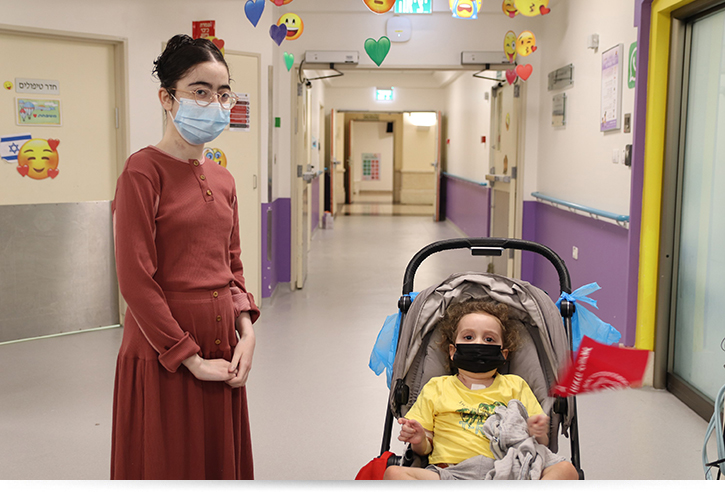page content
Skip page contentThree Hearts in Three Weeks
Over the past three weeks, great excitement took place at Schneider Children's following the arrival of a series of organ donations, among them three hearts. All were successfully transplanted
Date: 29.09.23 | Update: 02.10.23

Over the past three weeks, great excitement took place at Schneider Children's following the arrival of a series of organ donations, among them three hearts. Two children aged 3 and a girl of 14, who share the same corridor in the Cardiac Intensive Care Unit, received the gift of life one after the other. All three were awaiting a life-saving heart donation for several months, and now their wait has been rewarded.
The three children were hospitalized in critical condition at Schneider Children's all suffering from chronic heart failure. Little Ofek was dependent on a "Berlin Heart" (a boxed artificial device used until a human heart is transplanted) and had been in hospital for the past six months; H' was in a race against time as she was unable to be connected to an artificial heart, and was moments before being connected to the ECMO heart-lung machine; and Yair was born with a genetic anomaly that affected his heart and his condition was deteriorating.
The transplants were conducted by Schneider specialists, Dr. Gabi Amir, senior cardiac surgeon and head of the Newborn Cardiac Surgery Unit, and Dr. Georg Frankel, Head of Cardiothoracic Surgery. They were assisted by the team in the Surgical Suite and Anesthesia Department headed by Dr. Yelena Tzeitlin, and a team headed by Prof. Dan Arevut, Director of Cardiothoracic Surgery at Beilinson Hospital. The three recipients were transferred for follow-up care to the Cardiac Intensive Care Unit at Schneider, headed by Prof. Ovdi Dagan.
Over the past month, 12 children have received a new lease on life following organ transplantation conducted at Schneider Children's: 3 hearts, 3 livers and 6 kidneys, among which was a rare and particularly complex procedure of a dual transplant of both liver and kidney. The month prior to that, 6 organ transplants were completed at Schneider including a lung transplant in a 14-year-old girl. The operations were performed as part of three marathon surgeries that took place just one week apart from the other.
Dr. Efrat Bron-Harlev, CEO of Schneider Children's noted that "the donation of a heart in general, and for children in particular, is an uncommon event as the annual average number of heart donations stands at between 2-3! We are very pleased and excited for the families whom we have learned to know so well over the past months, and shared their deep concern for their child's fate. We wish the children a continued and full recovery and at the same time, express our immense gratitude to the brave families who donated the hearts of their loved ones to save children's lives. No words can sufficiently thank them enough."
Prof. Arevut added that "it is most exceptional to receive three heart donations in such a short space of time, and they arrived precisely at the 11th hour for these children. They represented an extraordinary chain of events also for the transplant teams, who were able to save the lives of such young children as a result of the courage of the families who donated the organs of their loved ones. We succeeded in overcoming all the challenges related to a marathon of complex transplants through smooth cooperation around the clock betweeen the various teams."
Schneider Children's conducts the majority of organ transplantatons in children in Israel, and among the few pediatric hospitals in the world capable of performing multiple organ transplants one after the other. To accomplish this, unique readiness is demanded of Schneider's transplant teams which include staff from the departments of organ transplantation, surgical suite, surgery, anesthesia, ultrasound, nursing, and intensive care.
Since its inception, Schneider Children's has conducted over 700 transplants of heart, lungs, liver and kidneys in infants, children and adolescents with rates of success on a par with leading medical centers in the world.




.jpg?BannerID=98)



.jpg?BannerID=97)

.jpg?BannerID=96)